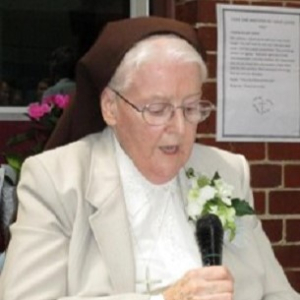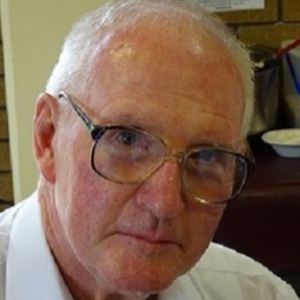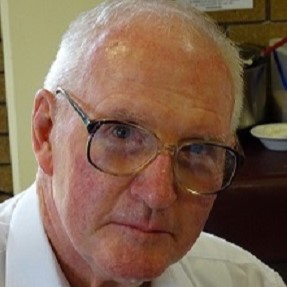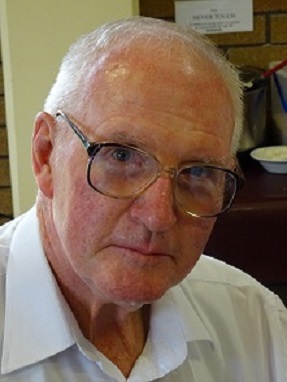Peter MALONE
Mulligans
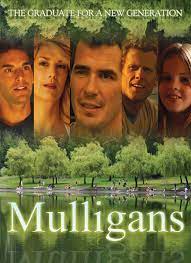
MULLIGANS
Canada, 2008, 92 minutes, Colour.
Dan Payne, Thea Gill, Charlie David, Derek James, Grace Vukovich..
Directed by Chip Hale.
Mulligan sounds like the name of a family. However, it is a golf term, the player getting a second try, a second attempt. This is explained early in the film – which does have a lot of golf throughout.
The film came out in 2008, from Canada, and it is interesting to look at Mulligans in the context of the time, films featuring gay characters, movements around the world, same-sex unions and, especially, political and social implications of same-sex marriages.
It is summer on a lake. The son of the family brings a good friend home from college. The friend is Chase, played by the writer of the film, Charlie David. He tires of his friend trying to set him up with girls, the party life, and finally comes out to his friend as gay.
The core of the film is not so much about Chase as a gay character, this being taken for granted, his behaviour, attitudes, way of communicating. Rather, it is the reaction of the various members of the family. The friend is taken aback and takes a long time to come to terms with the reality. The mother is wary, protective about sexuality, especially with her eight-year-old precocious daughter who seems to get a fixation on one of her teachers.
But the main character is the father. He and his sweetheart married very young, at a time when gay orientation was not acknowledged. He becomes very friendly with Chase and, while his wife and daughter are away, they have a sexual encounter. With the ensuing complexities, both wife and daughter glimpse the couple and their interactions in the woods.
Ultimately, the issues are out in the open, and the father has to make a decision about his life and his marriage.
- The title, the initial explanation, golf, a second try? The importance of golf throughout the film, for and against, successful and diameter, working on the golf links? Topic of discussion, being forbidden? Metaphor?
- Canadian production, cast? British Columbia locations, the home, summer atmosphere, golf course, the woods? The musical score?
- The situation, Tyler at college, his friends, Chase, the artist, travelling to Tyler’s parents? The summer situation, the family, Chase and sharing with Tyler, meals together, conversation, the welcome from Nathan, from Stacy, Birdie and her being outspoken?
- On the golf course, Nathan and his love for golf, conversation, Tyler and his skills, Chase trying out, awkward? Stacy and her being tired of golf talk? Two men working on the golf course and renewal, the course, fences…?
- Tyler and his partying, his girlfriend, Chase of the party, uncomfortable, talking, meeting Jarrod?
- C will hase is gay, coming out to Tyler, Tyler and his disbelief, unable to handle the situation, cautious of intimacy, issues of language?
- Stacy, with Birdie, the issue of the swimming pool and the little boy’s conversation, taking Birdie away, tennis, the coach, Bertie wanting her ears pierced, holding the coach up as an ideal? Stacy, exasperation, the decision to play golf? On the course, seeing Nathan and Chased together? Birdie later indicating she had seen the kiss?
- The family going to the grandmothers, cutting short the experience, coming home?
- Nathan and chased together for the weekend, the attraction, the intimacy, the talk, Nathan and Stacy and the teenage pregnancy, marrying, the 1980s? His not coming out? Suppressing his orientation? The sexual encounter with Chase, the swim? The sudden return home?
- The effect on Chase, talking with Jarrod, moving out, staying with him?
- The effect on Nathan, the tension with Stacie, birdie and her observations, the discussions, civilised, Stacy and her disbelief, but thinking about the past, talking things over with Nathan, his decision to move out? The agreements?
- Tyler, confused, angry, walking out? Jarrod persuading him to go to the bus stop, the farewell?
- A film of 2008, gay themes in films of the 21st-century, more open and frank, issues of repression, homophobia, honesty and resolutions?
Ravissment, Le/ The Rapture

LE RAVISSEMENT/ THE RAPTURE
France, 2023, 97 minutes, Colour.
Hafsia Herzi, Alexis Manenti, Nina Meurisse.
Directed by Iris Kaltenback.
The Rapture has many meanings in English, especially with faithful believers being taken up from Perth in The Rapture? However, the French title indicates a fascination, wonder.
The story is set in Paris, strong on atmosphere, the streets, bus routes, hospitals, the work of a midwife. However, while writer and director, Iris Kaltenback, is female and this is very much a female character study and perspective, the voice-over is by a male character.
The focus is on Lydia, played with complex verve by Hafsia Herzi. Enthusiastic, she discovers her boyfriend walking out on her. She goes to a party for her friend who reveals that she is pregnant. They have known each other since school days, bonded, strong friendship, knowing each other well. Lydia then is able to help and encourage Salome during the pregnancy.
Depressed with the breakup, Lydia wanders Paris, eventually going to sleep on a bus, encountering the driver (the company prefers “operator”), Milos from Serbia. He is reserved but they talk, have a one night stand, his not wanting to take it further.
There is a graphic birth sequence, hard for Salome, Lydia insistent, cajoling, encouraging. While Lydia says her care as a midwife is for the mothers rather than for the children, she becomes more and more attached to Salome’s daughter, suggesting the name Esmee, meaning Loved, taking the baby out, more frequent outings, but further complications when she encounters Milos at her hospital visiting his sick father, he thinking the baby is hers and she confirming, then telling him that it is his.
Milos becomes more and more attached, relishing being a father, Lydia arranging a weekly time when she is caring for the baby for them to meet. And invites them to meet his parents – which becomes too much for Lydia.
Ultimately, this is a story of an abduction, a rapture on the part of Lydia, but her eventually having to acknowledge the truth and surrender the baby to her mother. There is a trial, anticipated in the voice-over by Milos, the prison sentence, and her finally getting out – towards what future?
- The title, wonder, enthusiasm, fascination? Lydia and her preoccupation with Esmee? The consequences?
- The Paris settings, the initial drive through the streets, ordinary life, Milos and his voice-over, his perspective, narrating Lydia’s story, the puzzle, referring to the trial, the audience anticipating something going wrong?
- Lydia, age, experience, skill as a midwife, arriving home, the cake, enthusiasm, Julien leaving her? The party, her relationship with Salome? The conversation, the revelation of the pregnancy?
- The pregnancy, Salome and Jonathan, personalities, Lydia and her continued help, ultrasound, advice, massage…? Her continuing her work?
- Her moods, disappointment, the apartment, not going home, asleep on the bus, the encounter with Milos, tentative, talk, sharing experiences, the night together, Milos wanting to end the relationship, her persevering, calls?
- The intensity of the birth sequence, the strain for Salome, Jonathan present, Lydia and her insistence, encouragement, the baby tired, Salome pushing? The eventual birth? Hesitation, the child crying, tending the baby?
- Lydia, saying she cared for the mothers rather than for the children, preoccupation with Esmee, the name? Loved?
- The development of the relationship between Lydia and the baby, taking her out, feeding her, the attachment? Her seeing Milos in the hospital for his father? Telling him the baby was hers? Following him, telling him the baby was his? The consequences?
- The development of the attachment, concealing it from Salome, Salome and her postnatal depression, and the longtime bond from Lydia from school? The strong friendship? Jonathan and his wariness?
- The effect on Milos, the outings, his voice-over, not expecting to be a father, the attachment, taking Lydia and the baby to meet his family, the meal, the reactions, his mother intervening with questions, his father after his illness, the impact on Lydia, retreating to the bathroom, deciding to leave?
- Salome upset, Lydia’s explanations? The issue of moving to Brussels, Jonathan and the better money? Salome and her work, Lydia encouraged her to stay?
- The decision, Lydia listening outside the door, making a decision as regards the baby?
- Less access to the baby, her going to the centre, taking it, telling Milos that she wanted to go to Normandy, the train ride, the night, the happiness?
- Her ultimate decisions, the phone call from Salome, coming with the police, her sending Milos to buy the milk and to wait at the station, the interaction with Salome, giving back the baby? The police? The arrest of Milos, the interrogations?
- Milos and the description of the trial, the psychologists and their opinion about Lydia, manipulative or with a mental problem? Her going to jail?
- Milos and the meeting with Salome, observed by the audience outside the window?
- Lydia, in jail, finishing her sentence, leaving, walking along the street, Milos present? A future?
Isle Rouge, L'/ Red Island
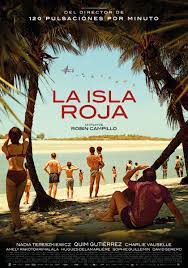
RED ISLAND
Belgium, Madagascar, 2023, 117 minutes, Colour.
Nadia Tereszkiewicz, Quimi Gutierrez, Charlie Vauselle, Alemy Ramotoarimalala, Hugues Delamarliere, Sophie Guillemiin, Romero, Vincent Schmidt.
Directed by Robin Campillo.
The Island of this film is Madagascar.
Audiences outside Africa and outside France may not be familiar with the colonial history of Madagascar. This film throws light on 20th century history, colonial France, the local people and their rebellions and repression, the moves for independence.
The writer-director, Robin Campillo (Eastern Boys, 24 MBH) draws on his own experiences in Madagascar. The setting is 1971-1972, a period of colonial occupation, uprisings, shift of policy on the part of France, a withdrawal of occupying forces.
For most of the film, there is a summer, holiday spirit, focusing on families where the fathers are stationed in Madagascar, military, pilots… The film creates a happy family atmosphere, meals together, swimming in the summer, dancing, jollity. While the film does focus on the adults, there is an eight-year-old boy, Thomas (Charlie Vauselle), rather withdrawn, prone to be absorbed in comic books, especially Fantomas (and the film frequently bringing these cartoon activities to animated life). Thomas observes, becomes friendly with little girl who loves the comic as well, bonds with her, at school, during the holidays.
While the film does show the perspective of children in the situation, there is also a focus on the adults, happiness and tensions within families, parents and children, husbands and wives. There is also a focus on a young Frenchman who has bought his new wife to Madagascar, she feeling lonely and isolated, returning to France, he becoming involved with a prostitute at the local brothel. There is also a focus on these women, working in laundries and packing, at one stage the group invading the military centre and beating the soldiers.
There are also military episodes, flights, commanders, indications of the uprisings, the military confrontation of the rebels.
So, while the audience may have enjoyed this perspective on Madagascar, the last 20 minutes may put response awry, the preparation of the French to leave, to go back to France, rebels being released, coming back to the town, proclaiming their bids for freedom with great vigour, the film then ending with them singing, the French withdrawing, a freedom for Madagascar. So, dramatically, the film symbolises the situation, the presence of the French, the influence, domination, and their departure and disappearance – leaving the local people, leaving them centre screen for the audience.
- Title? Madagascar? The red dust?
- Audience knowledge of Madagascar and its colonial experiences? The presence of the French? The aim of the colonials to make the local people French in consciousness, language and style? 20th century colonialism? The moves for independence and freedom?
- The main focus of the narrative on the families, the summer holidays, relaxation and enjoyment, meals, the beach, dancing, joviality? The background of the airbase? Planes and flights? The other officials? The offices dining room and staff? Hierarchy? These attitudes taken for granted?
- The focus on Thomas, aged eight, reclusive, in the box, peering through the cracks, his reading the comics, love for Fantomas, the visual re-enactments throughout the film, the animation and its style, the stories? Thomas and his place in the family, his older brothers, his father sometimes referring to him as a sissy? The mother and her care for her children? The older boys, mischief? The other families, the exuberant father and his joking and dancing, the happy mother, the daughter and her ballet? Meals, jovial, discussions?
- Thomas, meeting the little girl, their bonding, through the comic, sharing their experiences? And with her parents?
- Bernard, newly arrived from France, his wife, pale, uncomfortable, lonely, homesick, her participating in the meals, dancing? The departure? Bernard, going to the brothel, the encounter with the woman, the later meetings, taking her to the officers’ mess, the official permitting them to be there? His having to depart? Her attitude?
- Details of family life, the central family, father and his strictness, Pilate, his missions, aggravated, coming down? With his children? The mother, loving her children, the international travel, watching her husband flirt? The reconciliations? Thomas and the buying of the pearls, the father designing the ring, the birthday present, the mother relishing it? A realistic picture of family happiness and tensions?
- The colonial situation, the commanders, attitudes towards the local people, making them French, the rebels, imprisonment, the indication of rebels thrown from the planes to their deaths?
- The change in situation, the French withdrawing, preparations for the departure, the effect on each of the characters?
- The departure and the change of tone of the film? The literal departure of the family from the film?
- The return of the rebels, the vigorous speeches, history, freedoms, the young woman from the brothel, her singing, everybody singing and relish freedom? The end of colonialism?
Dumb Money
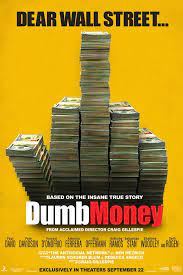
DUMB MONEY
US, 2023, 105 minutes, Colour.
Paul Dano, Pete Davidson, Vincent D’Onofrio, America Ferrera, Myha'la Herrold, Nick Offerman, Anthony Ramos, Seth Rogen, Talia Ryder, Sebastian Stan, Shailene Woodley, Kate Burton, Clancy Brown, Larry Owens, Dane de Haan, Olivia Thirlby.
Directed by Craig Gillespie.
Unless you are very well versed in the details of the financial world, the business world, stock exchange, familiar with the language of shares and trading, you may find it somewhat difficult to follow this story in detail. There has been quite a long tradition of American films about the financial world, even before the 1980s and Wall Street. We have seen the back rooms in Margin Call, the higher-life exploiters like The Wolf of Wall Street, a number of television films about the financial crisis of 2008, ironic pictures like The Big Short. Dumb Money is in this vein.
Most of us may have missed this true story from 2020-2021, particularly American (and we may have been more preoccupied with pandemic issues and limitations). But, as promotion tells us, this is something of a David and Goliath story. And it is a true story – and, after we have been both alarmed and exhilarated looking at these characters and the financial dealings, there is some satisfaction/alarm in seeing photos, videos, testimony with the actual people during the credits.
For those not in the know, so many of us, the phrase Dumb Money refers to funds invested by smaller individuals and groups, those whom the high flyers would generally despise and, probably, ignore. One of these is Keith Gill, a family man, a job, but in his spare time very interested in finance, stock exchange movement, investments, profits, hedge funds… He becomes interested in a particular company, GameStop, which does not seem to be doing well, invests, but Keith is also an influencer, with his own online program, quite a following, students, employees in shops, who have interest in finance and are looking for opportunities to invest. And, his followers trust him, and as long as he does not sell, they don’t. The value of the company rises, as they say, exponentially (or even more so).
Keith Gill, whose online tag is Roaring Kitty, is from Brockton Massachusetts, working on his computer in a back room, but thorough and meticulous in his research and communication. He is played by the very versatile Paul Dano, his wife by Shailene Woodley. And there are a number of younger character actors playing the range of investors, including Anthony Ramos and America Ferrera. And there are a lot of home scenes to balance the financial world, Keith and his interacting with his offhand brother, Kevin, comically played by Pete Davidson.
But the film also takes us into the high life of the hedge fund entrepreneurs, the powerful men who can draw on billions at beck and call, who are so confident, unspoiled, that they take no notice and then underestimate the financial David’s of this story. And, strong cast here with Seth Rogen, Nick Offerman, Vincent D’Onofrio, Sebastian Stan.
On the one hand, there is the comic atmosphere of Keith Gill’s home life, especially family sequences with his parents (Clancy Brown and Kate Burton), his interchanges with his carefree brother. On the other hand, there is the tension of movements on the stock exchange, holding to one’s convictions, not selling, hugely increasing profits, the danger of their being targeted and falling. And, in the background, government investigations about manipulation of the money market.
Keith Gill testified before Congress committee – as did the high flyers, Keith with a strong prepared statement – well accepted, the high flyers replying on subterfuge – and failing.
(There is a lot of coarse language throughout the film – and this is something of an understatement – as well as some particularly crass lyrics of songs which are playing throughout the action. The Australian classification notes: Strong coarse language.)
- The title, the tone, the judgement about investments?
- The 2020 setting, the background of Covid, the financial world dealing with the epidemic? The role of the Internet? Companies, games companies, networks, shrewd observers and investors, their moves?
- Homes and characters, offices, online activity, official meetings, finance, politics, legal?
- Keith Gill, life at home, scenes with his parents, his wife and her support, his job? Online, visiting the sights? You Tube and advice, “Roaring captivity”? His relationship with his brother, Kevin and his mocking his brother, the borrowing of the car?
- 2020, the games company, the investments, difficulties, reading the signs, Keith and his savings, advice for the friends and the online supporters? Success?
- The portrait of the big finances, Gabe Plotkin and his company, threats, sales, plans? Confidence, manoeuvres, discussions amongst themselves, the contacts and advice?
- Keith and his followers, Marcos and his work in the store, Rin and Harmony and their life together? Jennifer and her savings? The tension for them, investments and risks, there watching U-tube, they’re trusting Keith? Tested?
- Selling, waiting, finding the right time, Keith and his wife, the followers, selling, buying again? The complexities?
- The US House Committee on Financial Services, the interest in the case, a subpoena for all the main people, the heads of the companies, the interrogations?
- Keith, his being interrogated, his stances, convictions, legalities?
- The results, Keith and his security, his relationship with his brother and parents, the car for Kevin? The followers online and the success and security?
Pocketful of Rye, A/ 1985
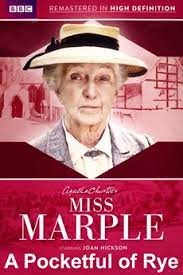
A POCKETFUL OF RYE
UK, 1985, 103 minutes, Colour.
Joan Hickson, Tom Wilkinson, Timothy West, Peter Davison, Fabia Drake, Stacy Dorning, Martyn Stanbridge, Clive Merrison, Rachel Bell, Frances Low, Selena Cadell, Mira Lena Kendall, Frank Mills, Jon Glover, Anette Badland.
Directed by Guy Slater.
Agatha Christie’s novels were enormously popular in the 20th century, many film and television series made. And, they continue into the 21st-century, new Poirot films, continued streaming screening of Miss Marple stories and those of Poirot.
While Angela Lansbury and Margaret Rutherford did portray Miss Marple, the main screen presentations were by Joan Hickson, Geraldine McEwan, Julia Mackenzie. It is interesting that the stories with the latter two Miss Marples was somewhat updated, the films with Joan Hickson had the post-war atmosphere, the late 1940s, the 1950s, life in the village, costumes and decor, vehicles, religious observance, traditional values…
There is a tenuous link with Miss Marple here, her recommending a maid who served in the house where murders occur.
Timothy West opens the film with great bombast, an unlikeable character, and murdered. His name is Rex – and the beginning of the link of the title with the nursery rhyme the king in his counting house, and the murderer choosing various clues from the rhyme for the development of the plot.
This time there is a very sympathetic police inspector, played by Tom Wilkinson more than a decade before his emerging so successfully in The Full Monty. Character actress, Fabia Drake, is also a strong screen presence.
The background to the murder is a mine in Africa and Rex betraying his partner. Rex has two sons, one in the business at home, the severe and humourless man, the other is Lance, in Africa, disliked by his father but returning to make him a proposition.
The plot is rather complex, according to the rhyme, and depends on truth about times.
- The popularity of Agatha Christie novels and films? The actresses as Miss Marple? Joan Hickson?
- The post-war settings, costumes and decor, cars? More proper ways of behaviour?
- The nursery rhyme and the title, the plan to crimes according to the rhyme, the king in his counting house, Queen and tea, the maid and the washing…?
- The opening, the focus on Rex, at the office, his laughter, the deals, his sudden attack? His death? His presence in the flashbacks, at home, dominating, sneering, his treatment of everybody in the family? Meals, behaviour? Intensely disliked? The fact of his marrying Adele, family criticisms, her age and the difference, issues of money?
- The family, the financial situation, the two sons, one at home and carrying on the family business, severe, the treatment of his wife, brutality and disdain? Her present the household, cheerful? Put upon? Her friendship with Adele and her support? The absent son, Lance, in Africa, in disfavour with his father?
- Mary Dove, the management of the household, working with the servants, especially with Gladys and the family’s criticism of her and her accidents? Financial management? Interactions with Rex? Her being formally correct with Adele and the other members of the family?
- Miss Henderson, age, sister-in-law to Rex, critical observations, haughty, despising Adele, the attitude towards her nephews? Observing what went on in the household?
- The cook, the attitude towards Gladys, her husband and his laid-back manner? The cook and her being upset?
- Gladys, the recommendation from Miss Marple, awkward, accidents? Her strange behaviour, phone calls, going out? Found dead? Lance and his commands, her infatuation, the rye…?
- The arrival of the police, the Inspector, initially wary of Miss Marple, liking her, seeking her advice, following it? His assistant?
- Suspects for the death of Rex? The mystery of the death of Gladys? Then the murder of Adele? Adele and her relationship with the tennis coach, suspicions, his leaving, his being apprehended and interrogated?
- Lance returning from Africa, with his wife, their bonding, her past, the arrests, saying she was bad luck?
- Coming back, the background of the mine in Africa, his father’s behaviour, the partner, the descendants and their being edged out of money? Lance and his rather carefree attitude, with everyone in the house, with Miss Marple?
- Miss Marple and the Inspector, following the nursery rhyme, unravelling the mystery? The importance of the timing? Lance and his lies, the past connection with Gladys and leading her on? His being unmasked? The truth about the mine, his arguments with his brother, seeming to compromise with the payoff, but his getting the money, leaving the airport, with Patricia, the crash?
- Mary Dove and the finances?
- Jennifer and the revelation of her identity?
- A satisfactory mystery, the suspect and the laying of false clues? And the role of Miss Marple?
First Friday Reflection. A different look at ‘Reparation’, Repairing a broken world.
First Friday Reflection. A different look at ‘Reparation’, Repairing a broken world.

‘Reparation’ seen as ‘repairing the damaged, the mutilated, the de-reverenced’. Gerardine Doherty OLSH. We used the word ‘reparation’ in a sense of penance and mortification. How can it be understood more challengingly now?
I believe that the quality of our reparation would be considerably enriched if we constantly made the effort to examine, not only from the economical, ecological, and political viewpoints but also from the theological stance, the grassroots of the evils of our day. This I think would empower us to act with greater creativity, effectiveness, and awareness of the real anxieties and urgent needs in today’s world.
A Reparation agenda.

A committed and positive reparation.
RIP, Sister Benedict Cooke MSC
RIP, Sister Benedict Cooke MSC
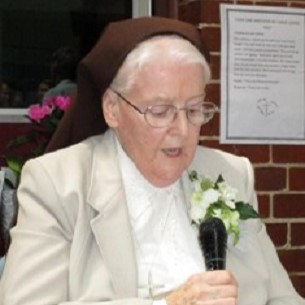
“Give me only your Love, and your Grace, that’s enough for me! Your love and your grace, are enough for me!”
Sr. M Benedict: Mary Theresa Cooke
Born: 14.08.1930 Carlton, Vic. Australia
First Profession: 03.02.1952 Mary’s Mount, Balwyn
Entered Eternal Life: 25.01.2024 Balwyn, Vic. Australia
Sr. Benedict was born in Carlton and lived in her family home of East Brunswick. She came from a loving Catholic family who worked hard, a value which Sr. Benedict emanated throughout her religious life.
At an early age Sr. Benedict suffered the loss of her mother, and as the eldest child took on the responsibility of caring for her siblings, two younger sisters and a brother aged only 4 years at the time. This tragic experience had a huge impact on her life, her love and commitment to her family, and faithfulness and trust in God. These qualities were deeply embedded within her when in 1950 she entered our Congregation as a postulant.
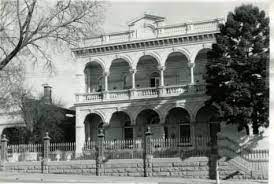
Mena House
In 1957 Sr. Benedict completed a course at Emily McPherson College of Domestic Science and then for the next twenty years of her religious life served in our hospital kitchens namely, Mena House Hospital in Melbourne, Sacred Heart Hospital in Moreland, Holy Cross Hospital in Geelong and at Mary’s Mount our Motherhouse in Balwyn. To this very demanding ministry Sr. Benedict gave her full strength and commitment. She dedicated herself to nourishing physically the patients, staff and sisters, an immense task.
After serving faithfully and tirelessly in this ministry Sr. Benedict was called to a new ministry of Pastoral Care. This ministry gave her the greatest sense of fulfillment and joy. She was a Pastoral Care Worker at Sacred Heart Hospital and at our Aged Care Facility St. Joseph’s Tower in Kew. In this new ministry she became the carer, listener, and spiritual nourisher of many people’s hearts and souls.
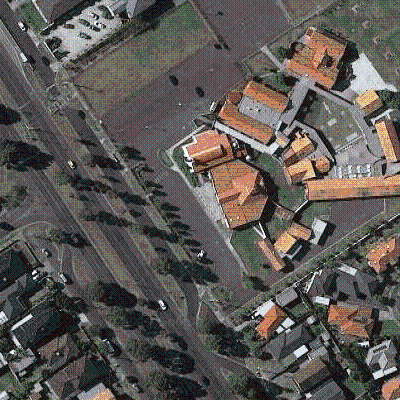
Kealba
In 1992 Sr. Benedict was transferred to St. Paul’s Parish in Kealba to assist in the Parish. During her time there she visited elderly and housebound parishioners, prayerfully distributing the Sacrament of Eucharist to them. Sr. Benedict was loved and respected by all those whom she visited. She truly lived our charism as a nourisher both physically and spiritually of God’s Love through her kindness, concern and care which she showed to all whom she encountered.
When she retired to St. Catherine’s Aged Care Facility in 2010 her faithfulness to prayer, her interest in others, and her hospitable presence continued. As her health deteriorated, sister was transferred upstairs to the Nursing care facility. Sadly, in recent years she became immobile and was unable to walk or move freely, totally dependent on the care of the nurses and staff.
During her long years of illness, Sr. Benedict gave witness to all of us in how to live with suffering and pain, with faithful and patient endurance. Even in her final days when she was extremely unwell, Sr. Benedict would still struggle to quietly say to any of us who visited, “Have you had a cup of tea, biscuit, something to eat?” To the very end her concern was for the nourishment, care, and wellbeing of others. Whether active or bedbound, Sr. Benedict lived our spirituality through her loving presence.

St Catherine's Balwyn
We the MSC Sisters give immense gratitude to God for the privilege of having Sr. Benedict as one of our much-loved members. We thank her family, whom she dearly loved, for sharing her with our MSC Congregation. As we surrender our Sr. Benedict back into the arms of God, we pray that
Sr. Benedict may now rest in peace after her long life’s journey and be drawn and enfolded in God’s eternal embrace of Love.

Requiem Mass for Sr. Benedict will be celebrated at Our Lady of Good Counsel Church, Deepdene on Tuesday 6th February, 2024 at 11.00 am then we will accompany her to her final resting place at the Eltham Cemetery.
On behalf of the Missionary Sisters of the Sacred Heart of the Australian Province,
Sr. Theresia Veenker msc
31st January 2024
A note from Pat Austin MSC, Parish Supply.
A note from Pat Austen MSC, Parish Supply.
Pat has written from Balranald Parish, Diocese of Wilcannia-Forbes, where he is currently on Parish supply. In fact, he has spent several years there in recent times.
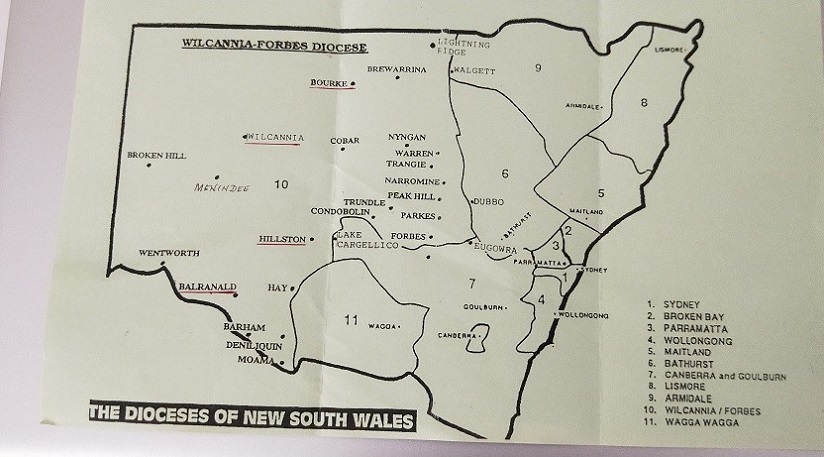
We can see the vast size of the diocese
In the early 1900s the first MSC priests ordained had as ministry parish supply all over Australia as well as the conducting of Parish missions, especially before we took on parishes and our first college, Downlands, in 1931.
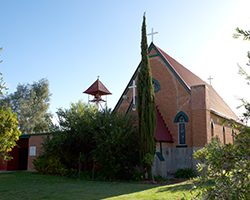
Balranald Church
It has been a ministry, especially for those in their later years, so a tribute to Pat who soon turns 84.
Pat has noted several MSC worked in the Wilcannia-Forbes diocese. We have done some Internet searching and will have some more information next week on this site.
Antiquaire, L'/ The Art Dealer
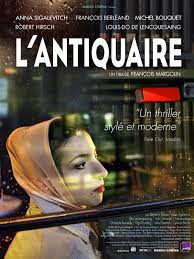
L’ANTIQUAIRE/ THE ART DEALER
France, 2015, 93 minutes, Colour.
Anna Sigalevitch, Michel Bouquet, Robert Hirsch, François Berleand, Louis-Do de Lencauesaing, Adam Sigalevitch, Alice de Lenzquesaing, Neils Schneider, Benjamin Siksou, Fabienne Babe.
Directed by François Margolin.
Stolen treasures by the Nazis has been a topic of several dramas like The Monuments Men and Woman in Gold. This French drama was made at much the same time as the other films.
We are introduced to a journalist, Esther, played by Anna Sigalevitch, whose husband is an art dealer and auctioneer. When he brings home a celebrated painting, her father, son of an art dealer who was executed by the Nazis at the beginning of World War II, recognises the painting.
This leads to Esther’s quest, going into archives, discovering documents about so many artworks appropriated by the Nazis, government decisions at the end of the war, the lack of recovery of paintings by the owners…
Esther is certainly an intense searcher, almost relentless, initially critical of her father marrying again soon after his wife’s death, advised by an art expert who is condemned as a collaborator during the war, who gives her a 16 mm print of home movies of her parents. There is also the complication of her uncle, a war hero in the resistance, a friend of a German entrepreneur.
There are many steps in Esther’s quest, tension in her marriage, her reliance on her son for help, and, solutions and public tirade against her uncle at a funeral. Her uncle is played by veteran French actor, Michel Bouquet.
A topic that is always interesting.
- The title and expectations? Art, paintings, classics, ownership, Nazis taking paintings, fraud, restorative justice?
- The two time periods, the home movies, black and white and colour, before the war, the outbreak of the war, the husband and wife, love for each other, the baby, art galleries, class and his visit from Germany, the proposal to transport the paintings, through Switzerland, Gene agreeing? The aftermath, his execution, Jeanne and her relationship with Klaus?
- The 20th century, the death of Jeanne, 2002? The introduction to the film, the opening with her song, the applause, the tone of the character? Her relationship with her father, resentment at his marrying again, so soon? Her relationship with her husband, with her son?
- Melchior, art dealer, the visit to the house, assessing the paintings, taking away the classic for appraising? Esther seeing it at home? Simon and his vague memories? Opening up the issue of Nazis taking paintings, issues after the war, galleries, restitution is, fraud? Government action and inaction?
- Esther, her quest, visiting archives, her son getting the autograph from her father and enabling her to enter? The helpful assistant at the archives, getting the vast documents, 600 records of artworks? Her investigations, hundreds missing? Suspicions, thinking she was being followed, that her son was being followed? Tensions with her husband, his commitment to his work and auctions, busy? Returning at the archives, the new assistant, the mislaid documents, her being ousted?
- Claude, accused of collaboration, falsely, friendship with the family, discussions with Esther, his giving her the 16mm film? His later confrontation with Raoul, the argument, his death, the funeral?
- Raoul, in the resistance, in Britain, considered British citizenship, the key to his owning the paintings and administering them? The relationship with Klaus, before the war before the war, his plans, relationship with Raoul, continuing – and the anomaly of the actor appearing not to have aged? Esther and her meetings with Raoul, his deceptions, her exposing him, his denials? At Claude’s funeral, her public denunciation? The news of his suicide?
- Melchior, the auction sequences, withdrawing the painting in question, not auctioning appropriated paintings during the war? The support of Esther? Esther and her relationship with her son, his helping her, their discussions? Jewish and half Jewish?
- Simon, his reactions to the investigations, to Esther’s hostility to his marrying Fabienne, the change, the wedding celebration, the vigorous dancing? Esther getting his autograph? His reluctance to think about the past, his mother, Esther getting him to watch the old film? Claude’s funeral? Relationship with Raoul?
- The author, his expose of war appropriations, postwar arrangements, cover-ups? Esther going to his session, the discussion?
- The various authorities, collaborating, not, documentation?
- Esther and her achievement, continuing issue of artworks, Nazis and the war?
End of Sex, The
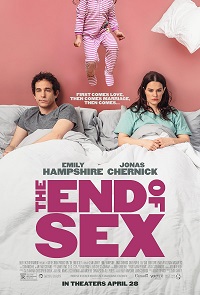
THE END OF SEX
Canada, 2022, 87 minutes, Colour.
Emily Hampshire, Jonas Chernik, Gray Powell, Lily Gao, Melanie Stefano.
Directed by Sean Garrity.
Fairly broad sex comedy. Well every human experience can be the subject of comedy, the assessment of its value is in the “How?”.
The film starts innocuously, a 10 year married couples seeing off their two daughters to a summer camp, finding themselves alone, wondering what to do, and, quick enough, the issue of sex coming up. The treatment is comic with all kinds of captions appearing during the film to focus audience attention and humour.
Older audiences may be reminded of the past. Younger audiences may wonder about their parents all this is a film for the middle-aged.
The couple have their moments of bewilderment, he working in an advertising agency and being interrogated by his co-worker who is very Frank about sex, engages in conversation with him, tries to bring him out of himself. She is co-teaching art to children during the summer, going to a Gallery and meeting the owner who had an infatuation with her in high school, very Frank in his expressions (and her noting that he doesn’t use a filter in his remarks). She fantasises about him, later meet him.
However, rather than the more surprising and, perhaps, eyebrow-raising is a scene of a threesome between the couple and the wife’s assistant at the art school. Although, the husband seems excluded from the whole event. Then they could decide to go to a sex club where they discover her mother and father present, to her embarrassment.
So, a somewhat titillating experience for them, for the audience, but many audiences may consider the whole experience rather silly.

